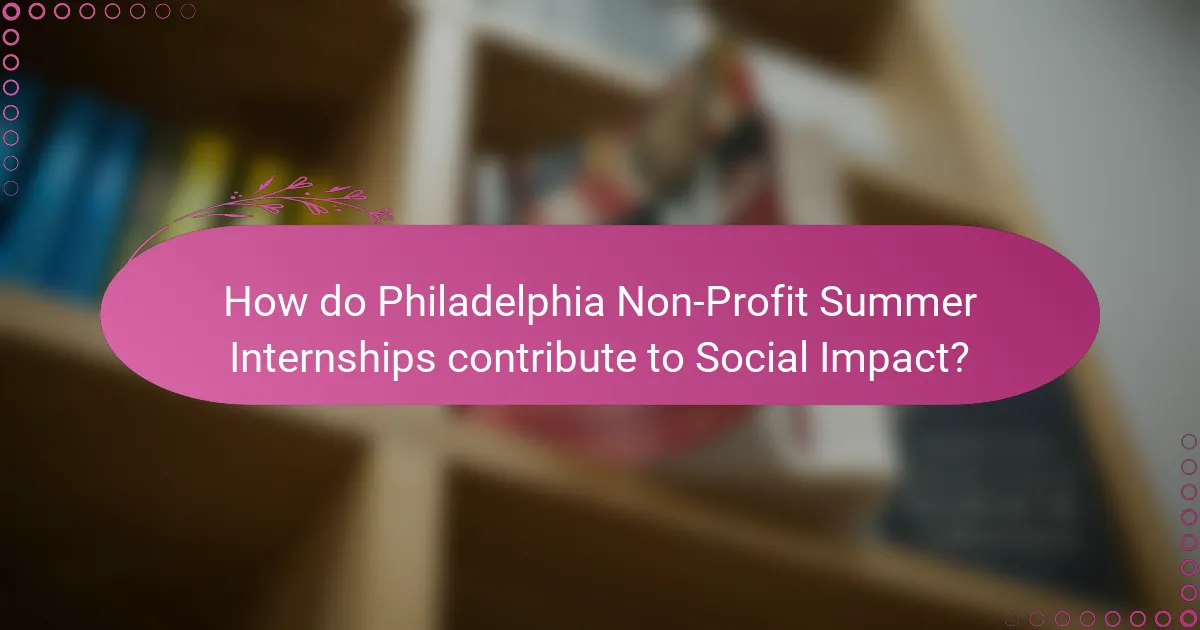
What are Philadelphia Non-Profit Summer Internship Opportunities?
Philadelphia Non-Profit Summer Internship Opportunities are positions offered by various non-profit organizations in Philadelphia during the summer months. These internships provide students and recent graduates with practical experience in the non-profit sector. Interns typically engage in community service projects, program development, and administrative support. Organizations such as the United Way of Greater Philadelphia and Southern New Jersey and the Philadelphia Foundation regularly offer these opportunities. Internships often include mentorship and networking opportunities. Participants gain valuable skills in social impact and volunteer coordination. Many internships are unpaid, but some may offer stipends or academic credit. These positions are competitive and may require an application process.
How do these internship opportunities benefit students?
Internship opportunities benefit students by providing practical experience in their field of study. These experiences enhance students’ resumes and improve their employability. Interns develop essential skills such as teamwork, communication, and problem-solving. They gain exposure to real-world challenges and learn how to navigate professional environments. Networking opportunities arise, connecting students with industry professionals. Research shows that 70% of internships lead to job offers. Additionally, internships can confirm or refine students’ career interests. Students also contribute to meaningful social impact through non-profit work.
What skills can interns develop through these positions?
Interns can develop a variety of skills through non-profit summer internship positions. These skills include project management, communication, and teamwork. Interns often learn how to organize and execute projects effectively. They enhance their verbal and written communication skills by interacting with diverse stakeholders. Teamwork is fostered as interns collaborate with other volunteers and staff members. Additionally, they gain problem-solving skills by addressing real-world challenges faced by non-profits. Interns also develop leadership abilities through taking initiative in various tasks. Networking skills are enhanced as they connect with professionals in the field. Overall, these experiences provide practical, hands-on learning that prepares interns for future careers in social impact sectors.
How do internships enhance career prospects for students?
Internships enhance career prospects for students by providing practical experience in their field of study. They allow students to apply theoretical knowledge in real-world settings. Internships help students develop essential skills such as communication, teamwork, and problem-solving. According to a National Association of Colleges and Employers survey, 60% of interns receive job offers from their host companies. This experience also expands professional networks, connecting students with industry professionals. Furthermore, internships improve resumes, making candidates more attractive to employers. Overall, internships are crucial for bridging the gap between academic learning and professional employment.
What types of non-profit organizations offer summer internships in Philadelphia?
Non-profit organizations in Philadelphia that offer summer internships include educational, environmental, health, arts, and social service organizations. Educational non-profits focus on community learning and youth development. Environmental organizations work on conservation and sustainability projects. Health non-profits address public health issues and provide community services. Arts organizations promote cultural activities and support local artists. Social service organizations assist vulnerable populations and provide essential resources. These organizations often seek interns to support their missions and enhance community engagement.
Which sectors within non-profits are most common for internships?
The most common sectors within non-profits for internships include education, healthcare, and environmental organizations. Education non-profits often seek interns for tutoring and program development. Healthcare non-profits provide opportunities in patient advocacy and public health initiatives. Environmental organizations frequently offer internships focused on conservation and sustainability projects. According to the National Council of Nonprofits, these sectors consistently attract interns due to their mission-driven work and community impact.
How can students identify reputable non-profit organizations?
Students can identify reputable non-profit organizations by researching their transparency and accountability. They should check if the organization has a clear mission statement and a well-defined purpose. Students can also look for financial information, such as IRS Form 990, which provides details on revenue and expenditures. Reviews and ratings from platforms like Charity Navigator or Guidestar can offer insights into the organization’s credibility. Additionally, students should verify if the organization is registered with the appropriate state and federal authorities. Networking with current or former volunteers can provide firsthand experiences and recommendations. These steps ensure that students engage with trustworthy non-profits.
What is the application process for these internships?
The application process for Philadelphia non-profit summer internships typically involves several key steps. First, interested candidates should research available internship opportunities on the websites of various non-profit organizations. Next, applicants need to prepare a resume and a cover letter tailored to the specific internship role. Many organizations require candidates to complete an online application form, which may include additional questions or essays. After submitting the application, candidates may be invited for an interview, either in-person or virtually. Following interviews, some organizations may conduct reference checks before making a final decision. It is essential to adhere to each organization’s specific deadlines and requirements throughout this process.
What documents are typically required for application?
The documents typically required for application include a resume, cover letter, and references. A resume outlines the applicant’s educational background and work experience. The cover letter expresses the applicant’s interest in the internship and highlights relevant skills. References provide contacts who can vouch for the applicant’s qualifications. Some organizations may also request a writing sample or portfolio. Additionally, proof of enrollment in an academic program might be required. These documents help assess the applicant’s suitability for the internship position.
How can students prepare for interviews with non-profits?
Students can prepare for interviews with non-profits by researching the organization’s mission and values. Understanding the specific programs and initiatives is crucial. Students should also review common interview questions tailored to non-profits. Practicing responses can enhance confidence and clarity. Networking with professionals in the sector can provide valuable insights. Additionally, students should prepare questions to ask the interviewer about the organization. Dressing appropriately for the interview is important to make a good impression. Finally, following up with a thank-you note can demonstrate professionalism and appreciation.

How do Philadelphia Non-Profit Summer Internships contribute to Social Impact?
Philadelphia Non-Profit Summer Internships contribute to social impact by providing hands-on experience in community service. Interns engage directly with local organizations that address social issues. This involvement fosters skills in leadership, teamwork, and problem-solving. Interns often work on projects that improve community well-being. According to a report by the National Council of Nonprofits, 70% of interns feel more connected to their communities after their experience. Additionally, these internships help non-profits expand their reach and effectiveness. They often result in increased volunteer engagement and resources for the organizations. This symbiotic relationship enhances both the interns’ personal growth and the non-profits’ mission.
What role do interns play in advancing social causes?
Interns play a significant role in advancing social causes by contributing fresh perspectives and skills. They often assist non-profits in executing projects that align with their missions. Interns help raise awareness about social issues through outreach and community engagement efforts. Their involvement can lead to increased volunteer participation and donations. Research indicates that organizations with interns report higher levels of innovation and efficiency. Interns also gain valuable experience, which can enhance their commitment to social causes in the future. This mutual benefit strengthens both the interns’ professional development and the non-profits’ impact.
How do interns help non-profits achieve their missions?
Interns help non-profits achieve their missions by providing essential support and fresh perspectives. They contribute to project implementation, allowing organizations to expand their reach. Interns often assist with research, helping non-profits identify community needs and tailor their programs. They also engage in outreach efforts, increasing awareness and participation in initiatives. Their involvement can lead to enhanced capacity for service delivery. A study by the Nonprofit Leadership Alliance found that 70% of non-profits reported improved efficiency through intern contributions. Additionally, interns bring skills in social media, which can boost an organization’s online presence. This ultimately helps non-profits fulfill their missions more effectively.
What measurable impacts can be attributed to intern contributions?
Intern contributions can lead to significant measurable impacts in non-profit organizations. These contributions often result in increased productivity and efficiency in project completion. Interns can enhance community outreach efforts, leading to improved engagement metrics. They may also assist in fundraising initiatives, contributing to increased revenue for programs. Additionally, interns can bring fresh perspectives that foster innovation within the organization. According to a study by the National Association of Colleges and Employers, 70% of employers reported that interns positively influenced their company’s culture. This indicates that the presence of interns can enhance team dynamics and collaboration. Overall, the measurable impacts of intern contributions include productivity gains, increased revenue, enhanced community engagement, and cultural improvements within non-profits.
Why is social impact important in non-profit internships?
Social impact is important in non-profit internships because it drives meaningful change in communities. Non-profit organizations focus on addressing social issues such as poverty, education, and health. Interns contribute to these missions by applying their skills to real-world problems. This experience enhances their understanding of social responsibility. It also fosters personal growth and professional development. Research shows that internships with a social impact component increase job satisfaction and engagement. According to a study by the Nonprofit Leadership Alliance, 80% of interns reported a greater sense of purpose after their experience. Thus, social impact is crucial for both the organization and the intern’s development.
How do internships foster a sense of community engagement?
Internships foster a sense of community engagement by connecting individuals with local organizations. They provide hands-on experience in addressing community needs. Interns often contribute to projects that directly benefit the community. This involvement creates a deeper understanding of local issues. Interns also build relationships with community members and leaders. These connections encourage a collaborative spirit and shared goals. Research shows that internships enhance civic responsibility among participants. A study by the National Association of Colleges and Employers found that 70% of interns reported increased community awareness.
What are the long-term benefits of social impact internships for the community?
Social impact internships provide long-term benefits to the community by fostering sustainable development and social equity. These internships often lead to increased community engagement and empowerment. Participants typically gain skills that enhance their employability, which can lead to economic improvement in the community. Additionally, social impact internships can create lasting relationships between organizations and community members.
Research shows that communities with active internship programs report higher levels of civic participation. A study by the Corporation for National and Community Service found that volunteers are more likely to engage in community improvement initiatives. Furthermore, these internships often result in the implementation of projects that address local needs, such as education, health, and environmental sustainability.
Overall, social impact internships contribute to building stronger, more resilient communities over time.

What volunteer experiences accompany Philadelphia Non-Profit Summer Internships?
Philadelphia Non-Profit Summer Internships often include hands-on volunteer experiences. Interns may engage in community service projects, which directly benefit local populations. Activities can involve organizing events, assisting with outreach programs, or participating in fundraising efforts. Interns typically work alongside experienced staff, gaining practical skills. These experiences enhance their understanding of social issues in Philadelphia. Interns also develop professional networks within the non-profit sector. Many organizations provide training sessions to prepare interns for their roles. This combination of volunteering and internship experience enriches the overall learning opportunity.
How can interns balance work and volunteer commitments?
Interns can balance work and volunteer commitments by prioritizing their schedules effectively. Time management is crucial for this balance. Interns should create a weekly planner to allocate specific time blocks for work and volunteering. They can also set clear boundaries to avoid overlap. Communicating with both employers and volunteer organizations is essential. This ensures that all parties are aware of the intern’s commitments. Additionally, interns should assess their workload regularly. This helps to identify any potential conflicts early on. Flexibility can also aid in managing both responsibilities. Finding volunteer opportunities that offer flexible hours can be beneficial. By following these strategies, interns can successfully manage both work and volunteer roles.
What types of volunteer activities are available alongside internships?
Volunteer activities available alongside internships include community service projects, mentorship programs, and fundraising events. Community service projects may involve working with local organizations to address social issues. Mentorship programs often connect interns with experienced professionals in their field. Fundraising events typically require volunteers to assist in organizing and executing initiatives that support non-profit missions. These activities provide valuable experience and enhance the overall internship experience. Engaging in volunteer work alongside internships can also expand professional networks and improve skills.
How do these volunteer experiences enhance the internship?
Volunteer experiences enhance the internship by providing practical skills and networking opportunities. Interns gain hands-on experience that complements their academic knowledge. This real-world exposure improves their problem-solving abilities. It also fosters teamwork and communication skills, essential in any professional setting. Additionally, volunteering allows interns to connect with industry professionals. These connections can lead to future job opportunities. Research shows that 70% of interns who volunteer report increased employability. Overall, volunteer experiences significantly enrich the internship experience.
What are the benefits of combining internships with volunteer work?
Combining internships with volunteer work enhances professional development and networking opportunities. Internships provide practical experience in a specific field. Volunteer work offers a chance to contribute to the community and develop soft skills. Together, they create a well-rounded resume. This combination can lead to increased job prospects. A study from the National Association of Colleges and Employers shows that 70% of employers prefer candidates with internship experience. Additionally, volunteer work demonstrates commitment and social responsibility. Thus, combining both experiences maximizes personal and professional growth.
How does volunteering complement professional development?
Volunteering complements professional development by providing practical experience and skill enhancement. It allows individuals to apply their knowledge in real-world settings. Volunteering also fosters networking opportunities with professionals in various fields. This interaction can lead to mentorship and job opportunities. According to a study by the Corporation for National and Community Service, 85% of employers prefer hiring candidates with volunteer experience. Additionally, volunteering helps develop soft skills such as communication and teamwork. These skills are highly valued in the workplace. Overall, volunteering enriches resumes and enhances employability.
What personal growth opportunities arise from volunteering?
Volunteering offers numerous personal growth opportunities. It enhances skills such as communication, teamwork, and leadership. Volunteers often gain hands-on experience in diverse environments. This exposure fosters adaptability and problem-solving abilities. Additionally, volunteering builds empathy and understanding of community needs. Engaging with different populations broadens perspectives. Research shows that 76% of volunteers report improved self-esteem. This boost in confidence can lead to better career prospects and personal fulfillment.
What tips can help students maximize their internship and volunteer experience?
Students can maximize their internship and volunteer experience by actively seeking learning opportunities. They should set clear goals for what they want to achieve. Regularly asking for feedback from supervisors enhances skill development. Building relationships with colleagues can lead to networking opportunities. Taking initiative in projects demonstrates commitment and can lead to more responsibilities. Documenting experiences helps in reflecting on skills gained and lessons learned. Engaging in professional development workshops offered by organizations can provide additional insights. Finally, maintaining a positive attitude fosters a collaborative work environment.
Philadelphia Non-Profit Summer Internship Opportunities are valuable positions offered by various organizations in Philadelphia, providing students and recent graduates with practical experience in the non-profit sector. These internships involve community service projects, program development, and administrative support, often leading to skill development in areas such as communication, teamwork, and problem-solving. The article covers the benefits of these internships, including enhanced career prospects and community engagement, as well as the application process, required documents, and the role of interns in advancing social causes. Additionally, it highlights the significance of combining internships with volunteer experiences to foster personal growth and professional development.